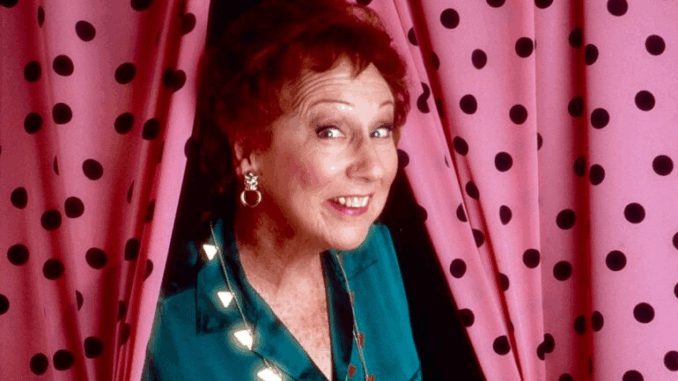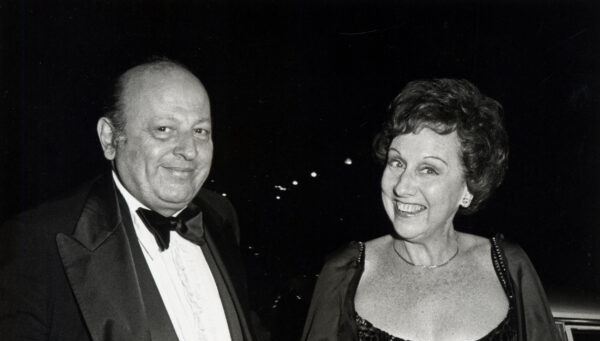
To the casual viewer, Edith Bunker might have seemed like a featherbrained housewife—Archie Bunker’s so-called “dingbat,” forever fluttering through life in a haze of naiveté. But longtime fans of All in the Family knew better. Beneath her high-pitched voice and wide-eyed innocence, Edith was a rock—a woman of quiet strength, unwavering moral clarity, and a heart large enough to carry a nation’s anxieties. And the actress who brought her to life, Jean Stapleton, was every bit as formidable.
Born in Manhattan and trained in the theater, Jean Stapleton wasn’t a household name when she stepped into the modest home of Archie and Edith Bunker in 1971. But over the course of nine unforgettable seasons, she would become one of television’s most enduring icons. Her portrayal of Edith Bunker earned her three Emmy Awards and two Golden Globes not only for comedic brilliance but for the layers of humanity she brought to a character who, in lesser hands, might have been dismissed as a caricature.
Stapleton’s Edith was sweet and trusting, but also thoughtful, compassionate, and, in her own way, revolutionary. As her husband Archie (memorably played by Carroll O’Connor) spouted off bigoted tirades from his easy chair, Edith often served as the show’s moral center. Whether gently challenging his views or offering kindness to those he belittled, Edith’s presence grounded the chaos with warmth and integrity. She raised their daughter Gloria (Sally Struthers) with deep affection, often acting as the bridge between Archie’s bluster and the progressive world rapidly shifting around them.
However, as the years wore on and All in the Family began exploring heavier dramatic territory—Edith facing a cancer scare, surviving an attempted assault—Stapleton found herself at a crossroads. Though she respected the show’s ambition, she was concerned about the gradual erosion of the comedic roots that had once defined the series. The Edith of the later seasons, she felt, was growing too burdened by pain, and too far removed from the vibrant, humorous woman viewers first fell in love with.
“I was a little concerned we were using the serious side of Edith too much, and I was not doing the riotous comedy that we used to do in the first three years,” she candidly admitted in an interview with The Christian Science Monitor. As the show transitioned into its sequel series Archie Bunker’s Place, Stapleton decided it was time to move on. She had given her all to Edith, but she also feared being forever typecast as the selfless, submissive housewife.
That decision wasn’t made out of frustration but out of artistic integrity. Stapleton never sought stardom for its own sake. A longtime admirer of acclaimed playwright Horton Foote and a dedicated stage actress, she had always valued character work above celebrity. “I wasn’t a leading lady type,” she told The Associated Press. “I knew where I belonged. And actually, I found character work much more interesting than leading ladies.”
Freed from the iconic role that made her famous, Stapleton’s career took a quieter but no less fulfilling turn. She chose her roles carefully, gravitating toward projects that piqued her artistic curiosity. In 1982, she was nominated for an Emmy for her powerful portrayal of Eleanor Roosevelt in Eleanor, First Lady of the World, a TV film that showcased her remarkable dramatic range. She turned down the role of Jessica Fletcher on Murder, She Wrote—a part that would later catapult Angela Lansbury to renewed fame but continued to appear in a wide variety of television series, including Murphy Brown, The Love Boat, Mrs. Piggle-Wiggle, and Everybody Loves Raymond. Her final role was in Horton Foote’s stage play The Carpetbagger’s Children, a fitting farewell to a career built on empathy, nuance, and storytelling depth.
Yet, despite all she achieved afterward, Jean Stapleton remained fiercely proud of All in the Family and the doors it opened—not only for her but for the sitcom genre as a whole. “For me, it was the highest education in comedy,” she once reflected. “My mind is so sharpened through that whole experience that now I can analyze a play of whatever length with a clarity and perception I never had before.”
Her legacy is more than just Edith Bunker’s unforgettable voice or gentle wisdom—it’s the way she brought humanity to the small screen in a time of deep cultural reckoning. Jean Stapleton didn’t just play one of TV’s most beloved mothers; she transformed what it meant to be a sitcom wife, blending comedy and conscience in equal measure.
Here are five facts about the late Jean Stapleton who played the most resilient of TV moms.
1. All the Family wasn’t Stapleton’s first project with Carroll O’Connor
Before they won America’s hearts as Archie and Edith Bunker, the duo starred in a 1962 episode of the Emmy-winning legal drama The Defenders. “The Hidden Jungle” featured O’Connor as murderous composer Joshua Ryder and Stapleton as Mrs. Larsen as the witness who puts him away.

2. The pair would go on to become lifelong friends and admirers
In his 1998 memoir, O’Connor wrote of his confidante, “What we then called ‘the women’s movement’ was getting into stride, and Jean — besides being herself involved in it, and being a pace-setter in the real world — saw to it that Edith, observed by twenty-five million people every week, was a courageous women’s champion in her own imaginary family.”
3. All the Family creator Norman Lear took Edith’s passing much harder than Stapleton
Stapleton only made guest appearances on Archie Bunker’s Place, but Lear couldn’t manage to officially pull the plug on her character. When the writers finally approached him about wanting to create storylines that would get Archie out of the bar — such as dates — Lear realized the time had come and called Stapleton for her blessing. Stapleton told the Archive of American Television that, of course, she was fine with it, because Edith was a work of fiction. “To me, she isn’t,” Lear responded. And so Edith earned a gentle death, dying of a stroke, off camera and in her sleep.
4. Stapleton watched the episode in a North Carolina hotel room
In the same interview, Stapleton explained “I was in Winston-Salem to play a part in the reopening of an old theater there which they were naming after [theater producer] Roger Stevens and I was in the hotel the night this episode (“Archie Alone”) aired. And Carroll did a great job after a long time away, he found one of Edith’s slippers under a chair. He did a whole monologue to this slipper. It was very moving.”And apparently very convincing. “The next morning, the maid entered the room,” Stapleton continued. “She saw me and she dropped her jaw and said, ‘My God, I thought you were dead!’”
5. Stapleton took the stage the night her real-life husband died

In 1983, Stapleton’s husband of 25-plus years, producer-director William Putch, was directing her in a touring production of George Kelly’s “The Show-Off” when he died suddenly of a heart attack. Stapleton completed the night’s performance because she said Putch would have wanted it that way.